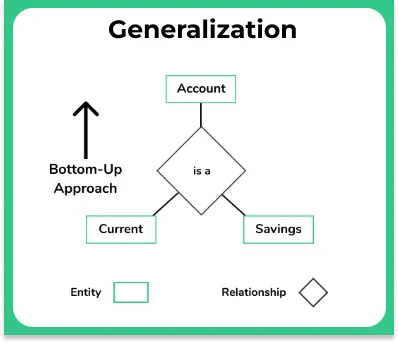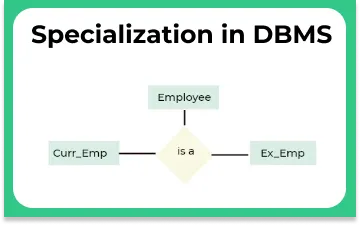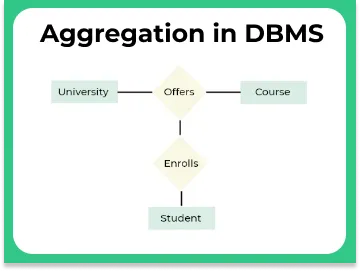Generalization, Specialization and Aggregation in DBMS

Generalization, Specialization and Aggregation in DBMS
On this page, we will learn about Generalization, Specialization and Aggregation in DBMS.
We will discuss each of them in brief.
What is the need for Generalization, Specialization and Aggregation in DBMS ?
With large databases it was realised that the ER model was become a little more complex and inconvenient to use.
Thus by programmers there were some additions in the ER model were suggested to reduce down on the complexity of the program, some new concepts were added which were –
- Generalisation
- Specialisation
- Aggregation
We will learn more about them below –
What is Generalization
In generalization we combine lower level entities to form a higher level entity. Thus its clear that it follows a bottom up approach.
Example –
In a bank there are two different types of accounts – Current and Savings, combine to form a super entity Account.
It thus follows system like classes, like super-classes and sub-classes right ?
It may also be possible that the higher level entity may also combine with further entity to form a one more higher level entity.

What is Specialization
While generalization may follow a bottom up approach. Specialization is opposite to that, it follows a top down approach rather.
Example –
Employee may be decomposed to further as current employee entity and ex employee entity.

What is Aggregation
Aggregation is simply when we would consider two different entities as a single entity together.
Example –
University offering course can be considered a same entity, when viewed from a student entity perspective.

Prime Course Trailer
Related Banners
Get PrepInsta Prime & get Access to all 200+ courses offered by PrepInsta in One Subscription
Get over 200+ course One Subscription
Courses like AI/ML, Cloud Computing, Ethical Hacking, C, C++, Java, Python, DSA (All Languages), Competitive Coding (All Languages), TCS, Infosys, Wipro, Amazon, DBMS, SQL and others






Login/Signup to comment